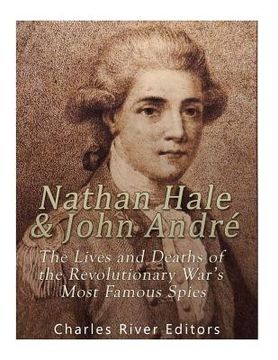Nathan Hale and John André: The Lives and Deaths of the Revolutionary War's Most Famous Spies (en Inglés)
Reseña del libro "Nathan Hale and John André: The Lives and Deaths of the Revolutionary War's Most Famous Spies (en Inglés)"
*Includes pictures *Includes quotes by both men about the war *Includes online resources and a bibliography for further reading For over 230 years, American schoolchildren have been taught about the story of Nathan Hale, or at least a legend of it, and in the process the myth of Hale and his possibly apocryphal final words have immortalized the young man as America's most famous spy, despite his failed mission. After the siege of Boston forced the British to evacuate that city in March 1776, Continental Army commander George Washington suspected that the British would move by sea to New York City, the next logical target in an attempt to end a colonial insurrection. He thus rushed his army south to defend the city, but Washington's army would ultimately be pushed west all the way through New Jersey the rest of the year. However, shortly before the colonists had to leave New York, Washington tried to implement intelligence operations around New York City, and one of the early spies was young Nathan Hale. A young officer in the Continental Army from Connecticut, Hale was asked by Washington to go behind British lines on Long Island and bring back information on what the British were up to there. Unfortunately, Hale was quickly identified by Loyalists, found with incriminating papers on his body, and executed the morning after he was caught. The 21 year old Hale's name may have very well been lost to history but for propaganda efforts to make him a martyr to the cause, most notably the reports of his last words about regretting that he had but one life to lose for his country. If Hale said anything like the quote he's best known for, he was likely reciting an exchange in the play Cato by Joseph Addison or playing off of it, but regardless of what he actually said, the story and the legend of Hale aimed to cover up the fact that his mission was an abject failure, due both to bad luck and ineptitude. No one who knew John André personally would ever have dreamed he would one day hang. He was raised by devoutly religious parents and was a loyal Englishman and solid officer in His Majesty's army. He had, it was rumored, an unfortunate romantic liaison that ended with a cancelled engagement, and during the early days of the American Revolutionary War, he had served his king in Canada before being captured and held as a prisoner of war. Once he was returned to his command, he was promoted in recognition of his strength of character under duress. His reputation was so sterling, in fact, that he was given a very sensitive role, that of gathering intelligence for the British Army as they tried to put down the rebellious American colonies. This assignment, and an alleged relationship to a beautiful young Loyalist in Philadelphia named Peggy Shippen, would lead him to one of the colonists' biggest war heroes, Benedict Arnold. Arnold had arguably been more instrumental for the colonies' successes from 1775-1778 than anyone else, even perhaps George Washington, but a confluence of events left him willing to betray the cause he had fought and bled so hard for after he became military commander of Philadelphia. In one of the most controversial and scrutinized episodes of the war, Arnold married Peggy Shippen despite her Loyalist sympathies, and while Arnold was willing to break the first rule, André broke the second rule by using Shippen to pass messages, possibly even playing on her own affections for him. Ultimately, it was in breaking the third rule of espionage that André made his fatal mistake, for when he met near West Point to facilitate Arnold's betrayal, he changed his clothes one fateful night in September 1780, he changed his destiny and earned a place in the history books at the cost of his life. He was tried and convicted of being a spy, and he was sentenced to hang by men who had more respect for him than they did for their turncoat countryman.

